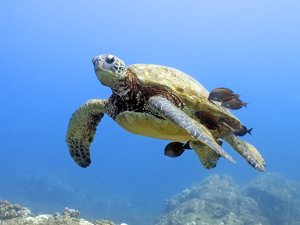
Marine Biology
The study of life in the oceans - from microscopic plankton to the largest animals on earth, the blue whales. Like biology, marine biology has many, diverse fields of study contained within it including the study of the molecules within cells (molecular biology), the functions and adaptations of organisms (physiology), and populations of organisms and their interactions with each other and their environment (ecology). What unites these areas as marine biology is the saltwater environment, whether it be the coastal wetlands and estuaries, rocky shorelines and beaches, coral reefs and kelp forests, or the vast open-ocean habitat and abyssal sea. This biology draws on other sciences such as chemistry, physics, geology, and oceanography, and includes disciplines such as marine microbiology, phycology (the study of algae), marine toxicology, fisheries and aquaculture, deep-sea ecology, invertebrate zoology, ichthyology (the study of fish), marine mammalogy, and marine conservation biology.
- Our dedicated marine science faculty’s expertise covers a broad range of disciplines, producing a well-rounded experience for our students.
- HPU’s small class sizes foster constructive interactions between faculty and students, and guarantee individualized attention.
- In addition to a rigorous classroom education, our marine science programs emphasize hands-on learning in laboratory and field courses throughout the degree curriculum.
- Our location in the center of the world’s largest ocean makes this the perfect place to study marine biology and oceanography!
- Even as an undergraduate, you’ll have the chance to explore and deploy sampling gear throughout Hawai‘i’s coastal and nearshore ocean environments aboard our 42-foot research vessel, Kaholo, in addition to learning scientific observation and analyses techniques in our laboratories at the Hawai'i Loa campus and Oceanic Institute.
- Students who graduate from our program leave with an in-depth knowledge of marine science and real-world skills for success in their future endeavors.
Students majoring in Marine Biology will:
- Demonstrate broad basic knowledge the fundamental principles in the biological and physical sciences.
- Integrate scientific principles to explain complex biological problems in the marine environment.
- Plan and implement observational and experimental studies of marine organisms and ecosystems and analyze the data obtained from these studies using appropriate mathematical and statistical techniques.
- Communicate scientific ideas effectively in written and oral formats using appropriate computer applications for data analysis and presentation.
- Find and evaluate published information from a variety of printed and electronic sources.
- Use a biological perspective to analyze complex problems and develop relevant questions pertaining to the marine environment.
- Application
- Transcripts
- Personal Statement
- $45 Application Fee
- Letter of recommendation
- Resume

WHAT CAN YOU DO WITH A MARINE BIOLOGY DEGREE?
A Bachelor of Science in Marine Biology from HPU provides the skills and strong academic foundation that can lead to a variety of career options. Our students are prepared for positions in marine and aquatic science careers as field and data technicians in research laboratories and government agencies, aquarists or outreach/education specialists in aquariums and zoos, or for a myriad of other positions in aquaculture, fisheries science, environmental analysis, marine policy, and many others. Students who aim to become leaders in the field, or ultimately direct their own research, will have the necessary background to pursue a master or doctoral degree in their chosen field. HPU even offers a Master of Science in Marine Science program for students who wish to pursue a graduate degree with us.

